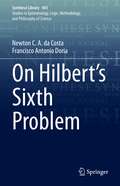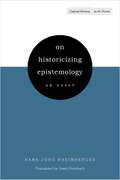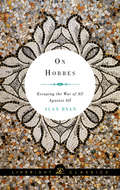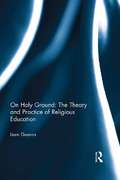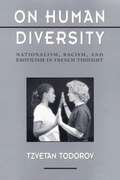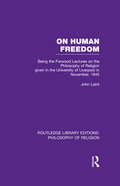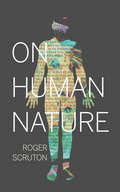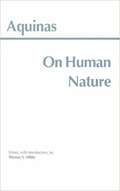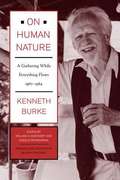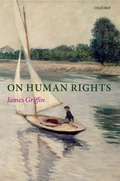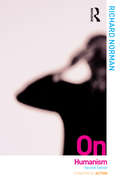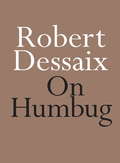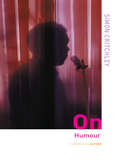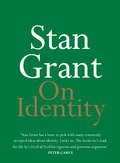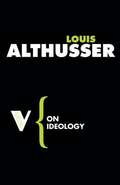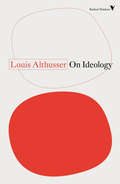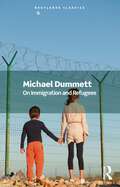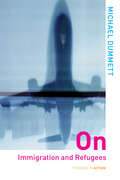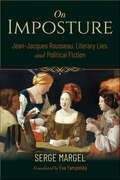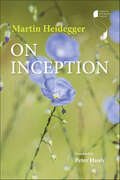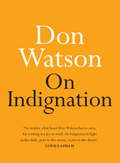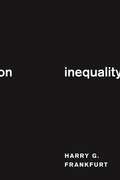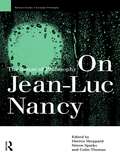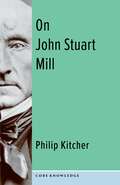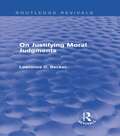- Table View
- List View
On Hilbert's Sixth Problem (Synthese Library #441)
by Francisco Antonio Doria Newton C. da CostaThis book explores the premise that a physical theory is an interpretation of the analytico–canonical formalism. Throughout the text, the investigation stresses that classical mechanics in its Lagrangian formulation is the formal backbone of theoretical physics. The authors start from a presentation of the analytico–canonical formalism for classical mechanics, and its applications in electromagnetism, Schrödinger's quantum mechanics, and field theories such as general relativity and gauge field theories, up to the Higgs mechanism.The analysis uses the main criterion used by physicists for a theory: to formulate a physical theory we write down a Lagrangian for it. A physical theory is a particular instance of the Lagrangian functional. So, there is already an unified physical theory. One only has to specify the corresponding Lagrangian (or Lagrangian density); the dynamical equations are the associated Euler–Lagrange equations. The theory of Suppes predicates as the main tool in the axiomatization and examples from the usual theories in physics. For applications, a whole plethora of results from logic that lead to interesting, and sometimes unexpected, consequences.This volume looks at where our physics happen and which mathematical universe we require for the description of our concrete physical events. It also explores if we use the constructive universe or if we need set–theoretically generic spacetimes.
On Historicizing Epistemology: An Essay (Cultural Memory in the Present)
by Hans-Jörg RheinbergerEpistemology, as generally understood by philosophers of science, is rather remote from the history of science and from historical concerns in general. Rheinberger shows that, from the late nineteenth through the late twentieth century, a parallel, alternative discourse sought to come to terms with the rather fundamental experience of the thoroughgoing scientific changes brought on by the revolution in physics. Philosophers of science and historians of science alike contributed their share to what this essay describes as an ongoing quest to historicize epistemology. Historical epistemology, in this sense, is not so concerned with the knowing subject and its mental capacities. Rather, it envisages science as an ongoing cultural endeavor and tries to assess the conditions under which the sciences in all their diversity take shape and change over time.
On Hobbes: Escaping the War of All Against All (Liveright Classics)
by Alan RyanA guiding light to America's Founding Fathers, Hobbes created the first truly modern political philosophy. In Leviathan, one of the greatest works of political philosophy of all time, English philosopher Thomas Hobbes created the idea of a "social contract" and set out to explicate a doctrine for the foundation of states and legitimate forms of government. In On Hobbes, Alan Ryan explains how Hobbes created the secular conception of the state and politics in one of the first truly modern works of political philosophy. Inverting Aristotle's view of politics, Hobbes argued that humans organize themselves into political communities not out of any sociable impulse to pursue the good life in common, but rather out of an unsociable fear of one another and for the sake of avoiding the greatest evil of all: death. Ryan explicates how modern notions of individual rights, sovereignty, representative government, and almost all liberal political theory find their foundation in the work of Hobbes. Excerpted here are: Leviathan, The Elements of Law.
On Holy Ground: The Theory And Practice Of Religious Education
by Liam GearonReligion has had notable and renewed prominence in contemporary public and political life. Religious questions have also been freshly examined in philosophy and theology, the natural sciences, the social sciences, psychology, phenomenology, politics and the arts. These fields reflect complex, multi-disciplinary understandings of religion, some hostile, some accommodating. For religious education this has all contributed to its own international renaissance. Religious education, in ensuring it is contemporary, shares with these fields the same criticality, the same distance between the study of religion and the religious life. Yet what are the grounds of this modern religious education? Through a systematic historical and contemporary cross-disciplinary analysis, answering this question is the ambitious task of the book. Chapters include: philosophy, theology and religious education the natural sciences and religious education the social sciences and religious education psychology, spirituality and religious education phenomenology and religious education the politics of religious education the aesthetics of religious education. The central problem of all modern religious education remains this: what are the grounds of religious education when religious education is no longer grounded in the religious life, in the life of the holy? Although this primarily appears to be an epistemological problem, it soon becomes a moral and existential one. The book will be of key interest to teachers, theorists and researchers working in religious education.
On Human Diversity: Nationalism, Racism, And Exoticism In French Thought
by Tzvetan Todorov Catherine PorterHow can we think about people and cultures unlike our own? In the early modern period, the fact of human diversity presented Europeans with little cause for anxiety: they simply assumed the superiority of the West. During the 18th century this view was gradually abandoned, as thinkers argued that other peoples possessed reason and sensibility, and thus deserved the same respect that Westerners accorded themselves. Since that time, however, Enlightenment belief in the universalities of human nature has fallen into disrepute; critics allege that such notions have had disastrous consequences in the 20th century, ranging from prejudice to persecution and outright genocide.
On Human Freedom: Being the Forwood Lectures on the Philosophy of Religion given in the University of Liverpool in November, 1945 (Routledge Library Editions: Philosophy of Religion)
by John LairdIn the author’s opinion there are three primary conceptions of human freedom - non-coercion, autonomy and indeterminism. He presents his thoughts to define, compare, distinguish and correlate these, not merely with regard to the freedom of the human will, but also and more generally with regard to freedom in human life and thought. The discussion is psychological, ethical and theological. Originally published in 1947.
On Human Nature
by Roger ScrutonIn this short book, acclaimed writer and philosopher Roger Scruton presents an original and radical defense of human uniqueness. Confronting the views of evolutionary psychologists, utilitarian moralists, and philosophical materialists such as Richard Dawkins and Daniel Dennett, Scruton argues that human beings cannot be understood simply as biological objects. We are not only human animals; we are also persons, in essential relation with other persons, and bound to them by obligations and rights. Our world is a shared world, exhibiting freedom, value, and accountability, and to understand it we must address other people face to face and I to I.Scruton develops and defends his account of human nature by ranging widely across intellectual history, from Plato and Averroës to Darwin and Wittgenstein. The book begins with Kant's suggestion that we are distinguished by our ability to say "I"—by our sense of ourselves as the centers of self-conscious reflection. This fact is manifested in our emotions, interests, and relations. It is the foundation of the moral sense, as well as of the aesthetic and religious conceptions through which we shape the human world and endow it with meaning. And it lies outside the scope of modern materialist philosophy, even though it is a natural and not a supernatural fact. Ultimately, Scruton offers a new way of understanding how self-consciousness affects the question of how we should live.The result is a rich view of human nature that challenges some of today's most fashionable ideas about our species.
On Human Nature
by Thomas Aquinas Thomas S. HibbsThis volume begins with excerpts from Aquinas' commentary on De Anima, excerpts that proceed from a general consideration of soul as common to all living things to a consideration of the animal soul and, finally, to what is peculiar to the human soul. These are followed by Treatise on Man, Aquinas' most famous discussion of human nature, but one whose organisation is dictated by theological concerns and whose philosophical importance is thus best appreciated when seen as presented here: within the historical philosophical framework of which it constitutes a development. Aquinas' discussions of the will and the passions follow, providing fruitful points of comparison with other philosophers.
On Human Nature: A Gathering While Everything Flows, 1967-1984
by Kenneth Burke William H. Rueckert Angelo BonadonnaAfter 1966, Kenneth Burke certainly changed what he was doing. There were no more text-centered analyses. He tended to write to a request or a conference or seminar topic of some kind. He relentlessly explains and applies logology; and just as relentlessly "attacks" hyper-technologism for the ways in which it is polluting the globe and threatening us in other ways.
On Human Rights
by James GriffinIn this book, Griffin shows how the language of human rights has become debased. He takes on the task of showing the way towards a determinate concept of human rights, based on their relation to the human status that we all share. He works from certain paradigm cases, such as freedom of expression and freedom of worship, to more disputed cases such as welfare rights--for instance the idea of a human right to health.
On Humanism (Thinking in Action)
by Richard NormanWhat is humanism and why does it matter? Is there any doctrine every humanist must hold? If it rejects religion, what does it offer in its place? Have the twentieth century’s crimes against humanity spelled the end for humanism? On Humanism is a timely and powerfully argued philosophical defence of humanism. It is also an impassioned plea that we turn to ourselves, not religion, if we want to answer Socrates’ age-old question: what is the best kind of life to lead? Although humanism has much in common with science, Richard Norman shows that it is far from a denial of the more mysterious, fragile side of being human. He deals with big questions such as Darwinism and ‘creation science’, matter and consciousness, euthanasia and abortion, and then argues that it is ultimately through the human capacity for art, literature and the imagination that humanism is a powerful alternative to religious belief. This revised second edition includes a new chapter on the debates between ‘the New Atheists’ such as Richard Dawkins and Christopher Hitchens and their religious critics, asking why the two sides in the debate so often seem to be talking past one another, and suggesting how the conversation could be made more fruitful. Richard Norman is a committed humanist and the author of many books including The Moral Philosophers and Ethics, Killing and War. He was formerly Professor of Philosophy at the University of Kent, Canterbury
On Humbug
by Robert DessaixWith his trademark eloquence and humour, Robert Dessaix, one of Australia's eminent writers, tackles humbug in the modern world-the tide of mumbo jumbo where words fall short of what they mean and motivations are not always what they appear.
On Humour (Thinking in Action)
by Simon CritchleyDoes humour make us human, or do the cats and dogs laugh along with us? On Humour is a fascinating, beautifully written and funny book on what humour can tell us about being human. Simon Critchley skilfully probes some of the most perennial but least understood aspects of humour, such as our tendency to laugh at animals and our bodies, why we mock death with comedy and why we think it's funny when people act like machines. He also looks at the darker side of humour, as rife in sexism and racism and argues that it is important for reminding us of people we would rather not be.
On Identity
by Stan GrantWhy does identity demand a choice between black and white? Tribalism, nationalism and sectarianism are dividing the world into us and them. Are we hard wired for hate? Stan Grant argues that it is time to leave identity behind and to embrace cosmopolitanism. On Identity is a meditation on hope and community.'Love is always the answer, it is said. Not if you are trying from somewhere in the Aboriginal domain to answer the cruel question, "Are you black or white?" Mapping family ties or finding a sense of self should be about love, but in the end, it is too often about politics. You must read this book if you have wondered why we make the choices we do.' MARCIA LANGTON
On Ideology
by Louis Althusser Ben BrewsterThis major voice in French philosophy presents a classic study of how particular political and cultural ideas come to dominate society. Spanning the years 1964 to 1973, On Ideology contains the seminal text, "Ideology and Ideological State Apparatus" (1970), which revolutionized the concept of subject formation. In "Reply to John Lewis" (1972-73), Althusser addressed the criticisms of the English Marxist toward On Marx and Reading Capital. Also included are "Freud and Lacan" (1964) and "A Letter on Art in Reply to Andr#65533; Daspre" (1966).
On Ideology: Ideology And Ideological State Apparatuses (Radical Thinkers Ser.)
by Louis AlthusserThis major voice in French philosophy presents a classic study of how particular political and cultural ideas come to dominate society. Spanning the years 1964 to 1973, On Ideology contains the seminal text, &“Ideology and Ideological State Apparatus&” (1970), which revolutionized the concept of subject formation. In &“Reply to John Lewis&” (1972–73), Althusser addressed the criticisms of the English Marxist toward On Marx and Reading Capital. Also included are &“Freud and Lacan&” (1964) and &“A Letter on Art in Reply to André Daspre&” (1966).
On Immigration and Refugees (Routledge Classics)
by Michael DummettThe philosopher Michael Dummett was one of the sharpest and most prominent commentators and campaigners for the fair treatment of immigrants and refugees in Britain and Europe. On Immigration and Refugees was the only book he wrote on the topic and among one of the most eloquent and important reflections on the subject to have been published in many years. Exploring the confused and often highly unjust and racist thinking about immigration, Dummett questions the principles and justifications governing state policies, pointing out that they often conflict with the rights of refugees as laid down by the Geneva Convention. With compelling and often moving examples, he points a new way forward for humane thinking and practice about a problem we cannot afford to ignore.This Routledge Classics edition includes a new Foreword by Sarah Fine.
On Immigration and Refugees (Thinking in Action)
by Sir Michael DummettMichael Dummett, philosopher and social critic, was one of the sharpest and most prominent commentators and campaigners for the fair treatment of immigrants and refugees in Britain and Europe. This book insightfully draws together his thoughts on this major issue for the first time. Exploring the confused and often highly unjust thinking about immigration, Dummett then carefully questions the principles and justifications governing state policies, pointing out that they often conflict with the rights of refugees as laid down by the Geneva Convention. With compelling and often moving examples, On Immigration and Refugees points a new way forward for humane thinking and practice about a problem we cannot afford to ignore.
On Imposture: Jean-Jacques Rousseau, Literary Lies, and Political Fiction (Studies in Continental Thought)
by Serge MargelImposture is an abuse of power. It is the act of lying for one's own benefit, of disguising the truth in order to mislead. For Jean-Jacques Rousseau, however, imposture is first and foremost power itself. In On Imposture, French philosopher Serge Margel explores imposture within Rousseau's Discourses, Confessions, and Emile. For Rousseau, taking power, using it, or abusing it are ultimately one and the same act. Once there's power, and someone grants themselves the means, the right, and the authority to force another's beliefs or actions, there is imposture. According to Rousseau, imposture can be found through human history, society, and culture. Using a deconstructionist methodin the classic manner of Derrida, On Imposture explores Rousseau's thought concerning imposture and offers a unique analysis of its implications for politics, civil society, literature, and existentialist thought.
On Inception (Studies in Continental Thought)
by Martin HeideggerOn Inception is a translation of Martin Heidegger's ber den Anfang (GA 70). This work belongs to the crucial period, before and during WWII, when Heidegger was at work on a series of treatises that begins with "Contributions to Philosophy" and includes "The Event" and "The History of Beyng." These works are difficult, even hermetic, but represent a crucial development in Heidegger's thinking. On Inception deepens the investigation underway in the other volumes of the series and provides a unique perspective on Heidegger's thinking of Being and of Event. Here, Heidegger asks, with a greater insistence than anywhere else in his work, what it might mean to think of being as event, and not as presence. Event cannot be thought without the sense of a beginning—an inception—and so, Heidegger insists, we must try to think of being as inception, as fundamentally inceptive. On Inception pursues rigorously the difficult and puzzling implications of this speculation. It does not merely extend work already undertaken but also opens doors onto wholly other pathways.
On Indignation
by Don WatsonCorrosive, mad and frequently fatal, indignation is a great destructive force in human affairs, and just as often a wellspring of mirth and merriment. Don Watson traces this seemingly ineradicable emotion in a journey that takes us, via his forebears, Flaubert and The Sopranos, from the Old Testament to Donald Trump.Trump's pitch had less to do with offering voters money and security than with offering them vengeance. He exploited the anger we feel when we are slighted or taken for granted, turning the politics of a sophisticated democracy into something more like a blood feud. He promised to restore dignity, slay enemies, re-make the world according to old rites and customs. He stirred indignation into tribal rage and rode it into the White House.It was a scam, of course, but wherever there is indignation, stupidity and lies abound.'Indignation is both seductive and contagious, and transforms society and politics. Don Watson's essay is penetrating, astringent, witty and disturbing. It must be read, carefully.'BARRY JONES
On Inequality
by Harry G. FrankfurtEconomic inequality is one of the most divisive issues of our time. Yet few would argue that inequality is a greater evil than poverty. The poor suffer because they don't have enough, not because others have more, and some have far too much. So why do many people appear to be more distressed by the rich than by the poor?In this provocative book, the #1 New York Times bestselling author of On Bullshit presents a compelling and unsettling response to those who believe that the goal of social justice should be economic equality or less inequality. Harry Frankfurt, one of the most influential moral philosophers in the world, argues that we are morally obligated to eliminate poverty--not achieve equality or reduce inequality. Our focus should be on making sure everyone has a sufficient amount to live a decent life. To focus instead on inequality is distracting and alienating. At the same time, Frankfurt argues that the conjunction of vast wealth and poverty is offensive. If we dedicate ourselves to making sure everyone has enough, we may reduce inequality as a side effect. But it's essential to see that the ultimate goal of justice is to end poverty, not inequality.A serious challenge to cherished beliefs on both the political left and right, On Inequality promises to have a profound impact on one of the great debates of our time.
On Jean-Luc Nancy: The Sense of Philosophy (Warwick Studies in European Philosophy)
by Simon Sparks Darren Sheppard Colin ThomasThis is the first book to consider the increasing importance of Jean-Luc Nancy's work, which has influenced key thinkers such as Jacques Derrida. All his major works have been translated into English, yet until now little has been made available on his place in contemporary philosophy.By showing how he situates his work in a contemporary context - the collapse of communism, the Gulf War, and the former Yugoslavia - this outstanding collection reveals how Nancy's engagement with Hegel, Marx, Nietzsche, Heidegger and Derrida makes him one of the key contemporary continental philosophers.Providing new perspectives on the issues of sense, art and community, these essays make it impossible to approach philosophy without reference to the work Jean-Luc Nancy.
On John Stuart Mill (Core Knowledge)
by Philip KitcherJohn Stuart Mill expressed many of the central tenets of liberalism with unsurpassed clarity and enduring influence. Yet Mill’s apparent victory in the marketplace of ideas has numbed us to the power of his arguments. To many readers today, his views can seem utterly familiar, even banal.Sharing insights from teaching Mill for many years, the eminent philosopher Philip Kitcher makes a cogent case for why we should read this nineteenth-century thinker now. He portrays Mill as a conflicted humanist who wrestled with problems that are equally urgent in our own time. Kitcher reflects on Mill’s ideas in the context of contemporary ethical, social, and political issues such as COVID mandates, gun control, income inequality, gay rights, and climate change. More broadly, he shows, Mill’s writings help us cultivate our own capacities for critical thought and ethical decision making.Inviting readers into a conversation with Mill, this book shows that he supplies tools for thinking that are as valuable today as they were in the nineteenth century.
On Justifying Moral Judgements (Routledge Revivals)
by Lawrence C. BeckerMuch discussion of morality presupposes that moral judgments are always, at bottom, arbitrary. Moral scepticism, or at least moral relativism, has become common currency among the liberally educated. This remains the case even while political crises become intractable, and it is increasingly apparent that the scope of public policy formulated with no reference to moral justification is extremely limited. The thesis of On Justifying Moral Judgments insists, on the contrary, that rigorous justifications are possible for moral judgments. Crucially, Becker argues for the coordination of the three main approaches to moral theory: axiology, deontology, and agent morality. A pluralistic account of the concept of value is expounded, and a solution to the problem of ultimate justification is suggested. Analyses of valuation, evaluation, the ‘is-ought’ issue, and the concepts of obligation, responsibility and the good person are all incorporated into the main line of argument.
